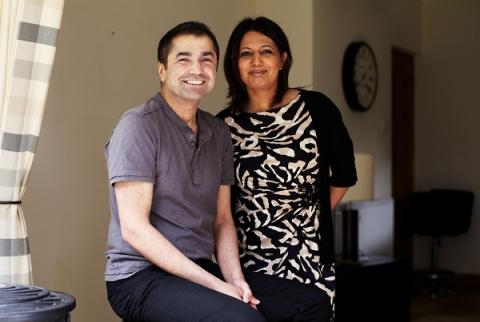Chloe Wright is Policy and Public Affairs Manager for Carers UK, a charity that provide expert information and advice for carers. Here she answers your questions about how to get support if you’re caring for a loved one.
How do I know if I am a ‘carer’? What does that word mean?
We do find that people don’t tend to think of themselves as a carer. It can be a difficult label to take on – it’s easier to see yourself as a daughter, friend, father or grandchild. But it’s important to recognise when you’re providing care or support for a loved one, so that you know your legal rights and what support you’re entitled to.
Caring comes in all different forms. You could be providing support for a short amount of time, for a few hours a week, but if you’re juggling that with a full-time job or with childcare then it can still have a big impact on your life. Or you might have been caring for 50 hours a week or more for several years.
There are a whole range of things someone might be doing to provide care – it’s not just about personal care, like helping with bathing. You could be helping them complete paperwork to get benefits, managing health appointments, or providing emotional support – these are all different ways of caring.
Why do you feel it’s important for people to be recognised as carers?
We want to make sure that carers know that they’re not alone, and also that they get recognition for what they’re doing. Our research shows that carers provide around £132 billion of unpaid support a year, which is equivalent to the cost of another NHS! Health and social care services are very dependent on this unpaid care – and we feel it should be valued and respected. It’s also about making sure that carers get access to the financial and practical support they’re entitled to and that healthcare professionals recognise their insight and expertise. As a carer, you often know a huge amount of technical medical information about the person you’re looking after, and this can be so valuable to health professionals.
What advice would you give to someone providing support to someone going through a bone marrow transplant?
It’s important to remember you’re not alone – there is financial, practical and emotional support there if you need it, nationally and locally.
Make sure you’re getting support for your needs as well, and that you look after your own health and wellbeing. If you don’t look after yourself, then it will be harder to look after the person you’re supporting. Sometimes this is about finding someone to talk to – we have an online forum for carers where you can go and talk about your experiences. But you may need more support with your caring role.
In England the Care Act makes it clear that if you’re providing unpaid care to someone who is older, disabled or seriously ill, then you are entitled to an assessment to look at the impact your caring role is having on you and what support you might need.
Another thing you can do it tell your GP – they can give you advice and could offer more flexibility around appointments, for example. It can be hard to make time for your own health needs, but if they know you’re a carer then they might be able to offer you more flexible appointments, perhaps right after the patient, and make your life easier.
Make sure you’re getting enough breaks – you should be able to get help through your GP or social services. It may be that you can take a break with the person you’re caring for or get some time on your own. Make sure you doing simple things to look after yourself: getting enough sleep, eating well and doing some exercise. These things will help you cope better with caring.
What benefits am I entitled to and are they means tested?
If you’re providing 35 hours of care or more, then you may be entitled to Carer’s Allowance which is the main benefit for carers. It is currently £62.10 a week. It isn’t means-tested, although there is a limit to how much you can earn at the same time and restrictions on how many hours studying you can do. You may also be entitled to other benefits, depending on your income and circumstances.
How can I explain my caring role to my employer?
We know that about half of all the 6.5 million carers in the UK are also working, and it can be difficult juggling both responsibilities. It’s important to speak to your manager if you can. Requesting flexible working my help you balance your roles - everyone has the right to request flexible working, not just carers, so you’ll be no different to your colleagues in this entitlement.
Where can I get more support?
At Carers UK we run an advice service, 5 days week. You can ring our advice line on 0808 808 7777 or email us on advice@carersuk.org to get information on how to get practical support such as care for the person you support, what benefits you’re entitled to, your rights at work and you can, find out how you can keep well or get support with the emotional side of caring. Sometime it helps just to have someone listen. We also have an online forum where you can connect with other carers and get tips and advice.
What else does Carers UK do to support carers?
We also use our research to highlight the role of carers, and give carers a voice with government, policy makers and the NHS. For example, we’ve recently made exciting progress in winning a campaign to make sure that those receiving Carer’s Allowance are exempt from the benefit cap. But there’s much more to do to ensure that all carers are well supported and able to have a life of their own alongside caring.
We also work to improve public understanding of caring and what carers do. Caring is a universal thing – at some point in their lives everyone will provide care for someone, or need care themselves. Caring is something to celebrate, alongside making sure that carers get the practical and emotional support they need. Find out more on our website www.carersuk.org
Find out more:
Read more about supporting someone through a bone marrow transplant
DISCLAIMER: At Anthony Nolan we take great care to provide up-to-date and accurate facts about stem cell transplant. We hope the information here will help you to look after yourself. Each transplant centre will do things differently, so this blog is just a general guide and it’s not intended to replace advice from your doctor. Please speak to your transplant team for more details about your own situation.

